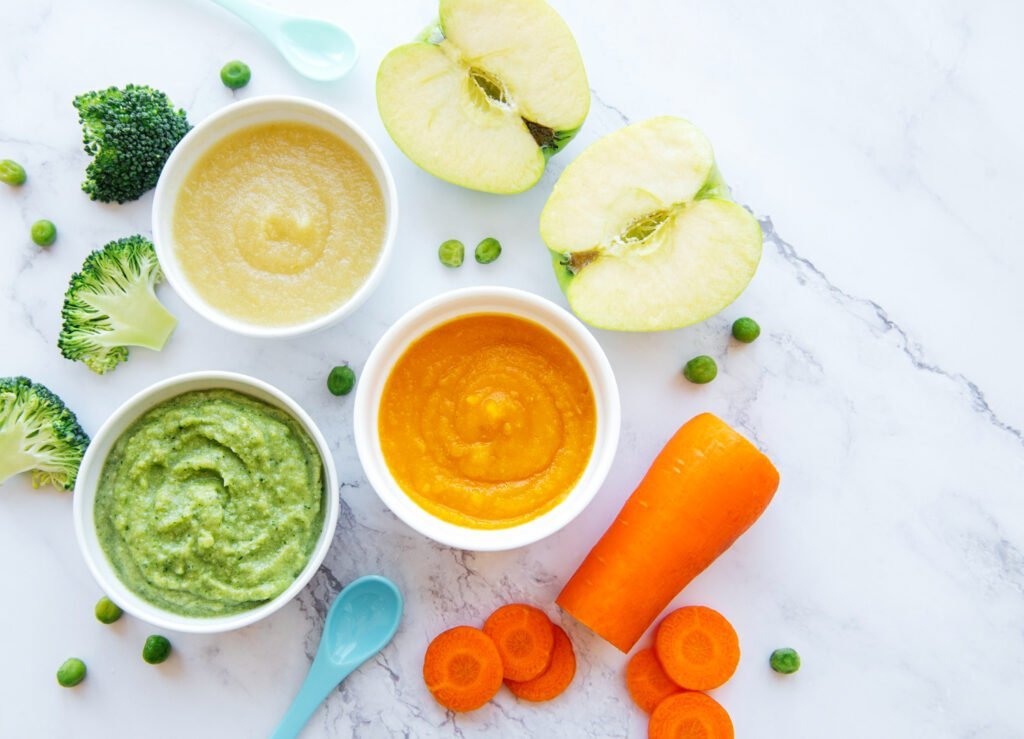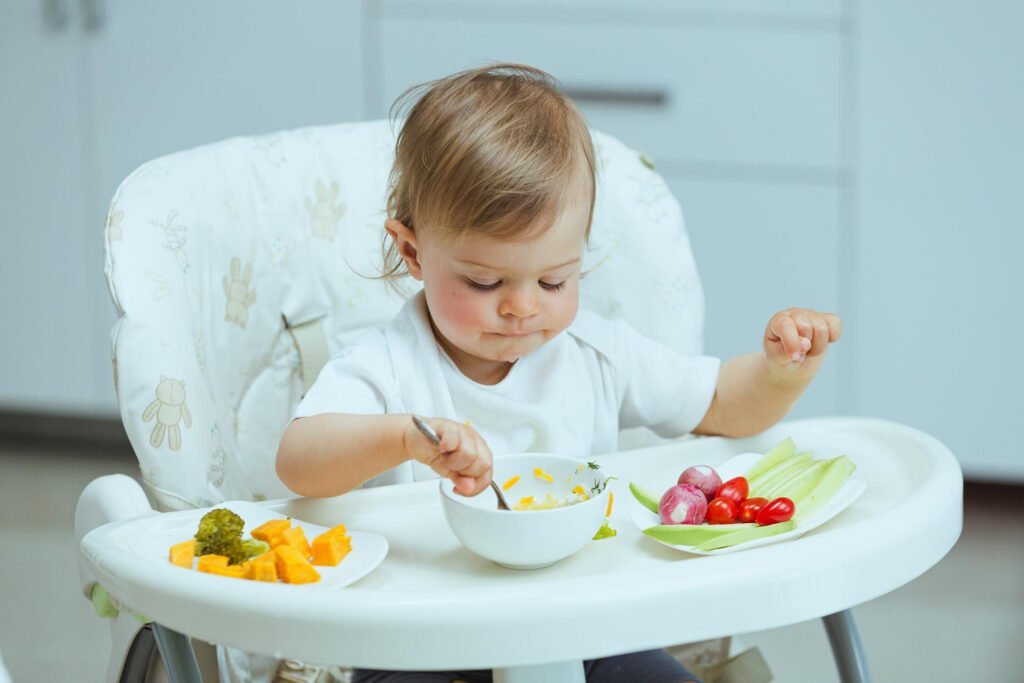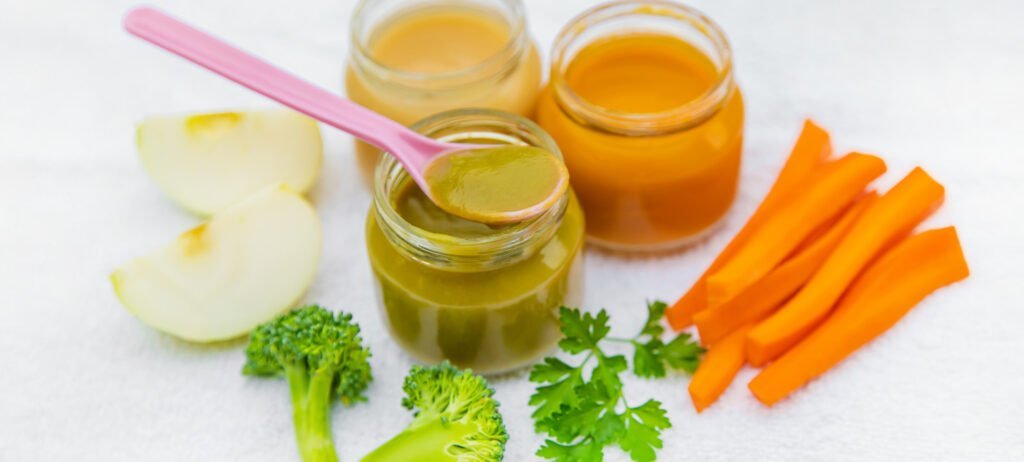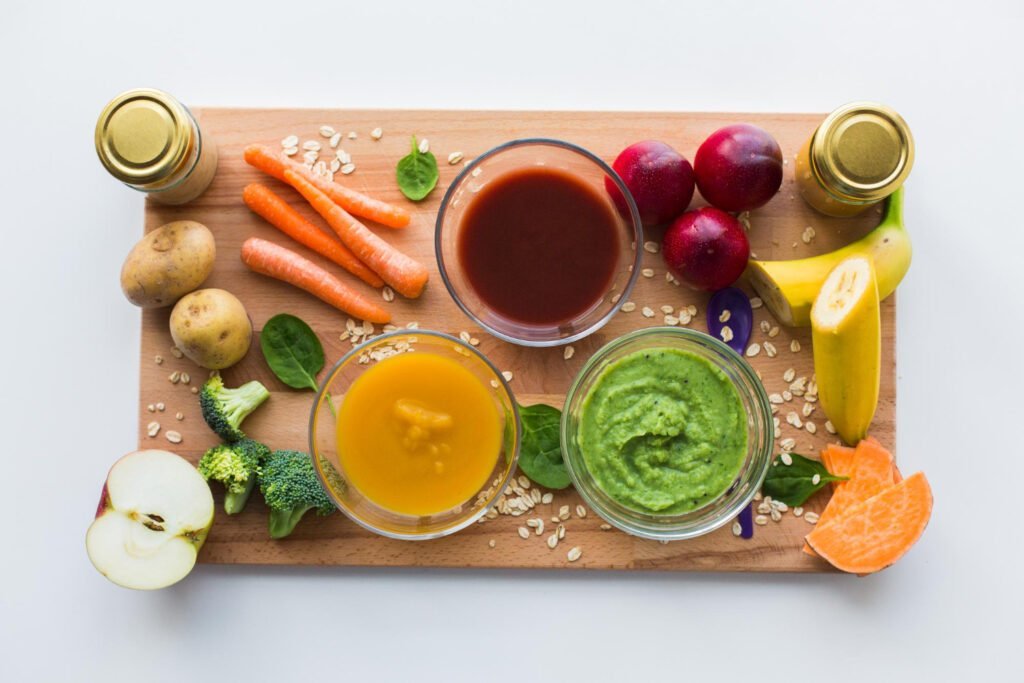Organic Baby Food: The Secret to Your Baby’s Healthier Future?
We’ll admit it: being a parent today can be something like navigating an endless array of options regarding what’s best in the best interest of our child. Of all the decisions you make as a parent, choosing the right food is among the most crucial. With your myriad choices, the notion of choosing “organic baby food” might be a shining example of health and simplicity. It’s about nourishment and a better beginning for your baby. Are you intrigued by the buzz? Let’s explore how organic baby food reshapes parenting today with benefits beyond nutrition.

Understanding Organic Baby Food
“Organic baby food” refers to products produced without synthetic fertilizers, pesticides, Genetically Modified Organisms (GMOs), and synthetic additives. It’s about adhering to the natural way of making food and ensuring that the food that will end up on your baby’s plate is as close to its natural state as it can be. This dedication to purity usually gives parents peace of mind and confidence that they’re giving their children clean and healthy food.
These items are usually branded with authentic organic certification logos, like the USDA Organic seal that guarantees the use of strictly organic agricultural practices. If you opt for organic, you will remove any potentially harmful substances from the baby’s food, thus setting the foundation for a healthy and balanced start.
A Little Trip Down Memory Lane
Let’s take a trip back to the past for a second. Before the age of industrial production and mass agriculture, organic was not a fad; it was the standard. People grew and ate food without synthetic chemicals and relied on the natural, sustainable cycles that remained. Over time, an increase in demand caused the introduction of farming techniques used in industrial agriculture, which included using chemicals and GMOs to boost yield and efficacy.
Yet, the pendulum is moving back. Parents are returning to natural methods with growing concerns about environmental sustainability and health. Organic and natural Food for babies is one of the outcomes of this change, giving parents the chance to rekindle the old-fashioned dietary wisdom. It’s like inviting an element of the grandparents’ simpleness along with their knowledge and experience into our hectic 21st-century lives.
Dietary Benefits that Astonish
One of the most notable advantages of organic baby food is its nutritional profile. Due to better methods of managing soil and farming, organic food items typically have more vital nutrients, such as vitamins C and E, as well as magnesium, iron, and the mineral phosphorus. These nutrients are essential to your baby’s growth and development, helping with everything from brain development to bone health.
Furthermore, organic food isn’t subjected to synthetic fertilizers and pesticides employed in conventional farming, which can cause residues to be left on food items. While most regulatory agencies think these residues are acceptable within a certain limit, many parents would rather err on the safe side, choosing organic food to limit even small quantities of chemical residues.

Health Perks for Your Little One
Babies are extremely sensitive to chemicals and may absorb them more efficiently than adults because of their size and growing systems. They are more susceptible to the negative consequences of pesticide residues and other chemicals commonly present in traditional foods. By selecting organic baby food, you’re possibly reducing your child’s exposure to toxins and giving them a healthier diet.
Additionally, research suggests that children who eat organic food may have fewer pesticides within their bodies and less risk of developing allergies. Although research is ongoing, many parents have reported fewer problems with food sensitivities or reactions to food when changing to organic alternatives. This assurance can be valuable so you can concentrate more on being with your child instead of worrying about their food.
Go Green by Using Organic
Purchasing organic baby food is not solely a health decision for the individual but also an environmentally responsible one. Organic farming methods are developed to preserve the soil and encourage ecological balance, which benefits the environment in many ways. These practices help conserve water, boost biodiversity, and increase soil fertility, ensuring the resources we depend on today will be available to future generations.
If you select products that conform to organic guidelines, you’ll reduce the quantity of chemical waste released into the environment. This results in cleaner water and air, contributing to an improved ecosystem. With the threat of climate change and environmental degradation on the horizon at a large scale, every move towards sustainability is vital.
The Not-So-Perfect Side
As with all things, organic baby food has its challenges. The most frequently cited disadvantage is the cost. Producing organic food typically requires more time and energy, which can increase costs. Furthermore, organic food products may not always be readily available at the local store and may require some planning and time to locate.
But, many parents feel the long-term environmental and health benefits far outweigh these concerns. It’s seen more as a benefit than a cost and more of an investment in your child’s future. Additionally, as the demand for organic food products grows, economies of scale can reduce prices and increase accessibility as time passes.

Smart Tips for Choosing Organic Baby Food
To ensure you’re making the best choice for your child, here are some practical tips:
- Read Labels Carefully: Check for certified organic seals to ensure the food meets strict organic standards. Brands like Happy Baby Organics and Earth’s Best Organic Baby Food are known for their reliability.
- Research Brands: Get familiar with trusted names in the industry. Besides Happy Baby and Earth’s Best, Plum Organics and Gerber Organic for Baby are committed to high-quality organic products.
- Understand Ingredients: Simplicity is key. Choose products with minimal, whole-food ingredients you recognize. Avoid artificial flavors, colors, and preservatives that are non-essential.
- Consider Homemade Options: Making organic baby food can be simpler than it sounds and allows for complete control over what goes into your child’s diet. Plus, it’s fun to introduce homemade love and creativity into your child’s meals.
DIY Organic Baby Food: Fun and Fresh
Making your own “organic baby food” at home can be an incredibly rewarding experience that allows you to take charge of every ingredient your baby consumes. Start with basic staples like organic carrots, apples, or sweet potatoes. Steam or bake them, then puree them into a smooth consistency suitable for your baby.
This DIY approach not only ensures freshness but also gives you the flexibility to introduce a variety of flavors and textures at your own pace. It can also be more cost-effective in the long run, especially if you buy organic produce in bulk. Many parents find joy and satisfaction in preparing their baby’s meals, knowing exactly what’s in every spoonful.
Introducing Organic: A Parent’s Guide
If you’re considering transitioning to “organic baby food,” remember that every child reacts differently to dietary changes. Here are a few steps to ensure a smooth switch:
- Start Slowly: Introduce organic foods gradually, blending them with the items your baby is familiar with to minimize digestive disruptions.
- Observe Reactions: Pay attention to how your baby responds to new foods, watching for any signs of allergies or sensitivities.
- Consult Your Pediatrician: Always seek professional guidance when making significant dietary changes. Your paediatrician can offer tailored advice and meet your child’s nutritional needs.
- Be Patient: Transitioning to organic might take time. Be consistent and patient as your baby adapts to their new diet.
Real Families, Real Success Stories
Countless families have embraced the move to organic baby food and are eager to share their positive experiences. Parents often report that their babies seem more energetic, experience fewer digestive issues, and are less fussy during meals. Some even notice an improvement in their babies’ skin conditions, attributing these changes to a cleaner, organic diet.
These stories are not just anecdotal; they highlight a growing trend among parents prioritizing health and sustainability. Many find that investing in organic options provides peace of mind and long-lasting benefits, making the occasional search for these products worthwhile.
What’s Next in the Organic World?
The future of “organic baby food” looks promising as awareness and demand continue to rise. New players and innovations in the market are making organic options more accessible and diverse. Brands like Organicbabyfood24 are leading the charge in offering a wider array of organic products, often packaged in eco-friendly materials, to enhance their sustainability profile further.
The focus on transparency and traceability is also increasing, with more brands detailing their sourcing and production processes. This enables consumers to make informed choices, fostering trust and encouraging an organic lifestyle. As these trends progress, we’ll likely see continued growth and innovation within the organic baby food sector.

Conclusion
Choosing “organic baby food” isn’t just a decision about how to feed your baby—it’s a commitment to fostering health and sustainability for future generations. By opting for organic, you’re taking a conscious step towards a lifestyle that emphasizes quality over convenience, nourishment over quick fixes, and health over expedience.
Every spoonful of organic baby food helps build a foundation for your child’s healthier future while contributing positively to the environment. The ripple effects of this choice go beyond your family, potentially impacting society and the planet as a whole. So, why not start today? Your baby—and the world—will surely thank you.
Recommended Toddler Parenting Resources
Parenting doesn’t end with the swaddle years—here’s where to turn for tips as your child begins to toddle:
- Creating a Restful Night: Help your toddler enjoy sleep with essentials from How to Dress Toddler for Sleep: The #1 Mistake Parents Make! alongside advice on routine with How to Get Toddler to Stay in Bed All Night.
- The Great Crib Escape: Master transitions smoothly with insights from What to Do When Toddler Climbs Out of Crib?
- Potty Training Adventures: Navigate this milestone effectively with The One Thing You Must Do When Potty Training Your Stubborn Toddler!
- Healthy Habits When Ill: Offer comfort food options with What to Feed Kids When Sick: A Comprehensive Guide.
- Encouraging Independence: Start good habits early with The Surprising Age: When Can Kids Brush Their Teeth? and introduce water confidence with The Best-kept Secrets on How to Teach a Toddler to Swim.
- Handling the Food Fling: Tackle mealtime challenges with insights from How to Stop Toddler from Throwing Food.
- The Ultimate Guide to Muslin Swaddles: Experience the ultimate in baby comfort with Muslin Swaddle Secrets
Frequently Asked Questions (FAQs)
- What are the top benefits of organic baby food?
- Organic baby food offers natural ingredients free from harmful chemicals, richer nutritional profiles, and supports sustainable farming practices.
- Is organic baby food worth the extra cost?
- Many parents find the health and environmental benefits valuable, justifying the additional investment for higher-quality nutrition.
- How can I verify if baby food is organic?
- Look for certification seals like USDA Organic, which assures compliance with stringent organic standards.
- What are the potential downsides of organic baby food?
- The key drawbacks include higher costs and sometimes limited availability, but the long-term benefits often outweigh these challenges.
- Which brands offer reliable organic baby food?
- Trusted brands include Happy Baby Organics, Earth’s Best Organic Baby Food, Plum Organics, and more, known for their commitment to quality and transparency in organic production.
By choosing organic baby food, you’re paving the way for a brighter, healthier future for your child while playing a part in creating a sustainable world. Embrace the change, and watch your baby and peace of mind flourish!





































































